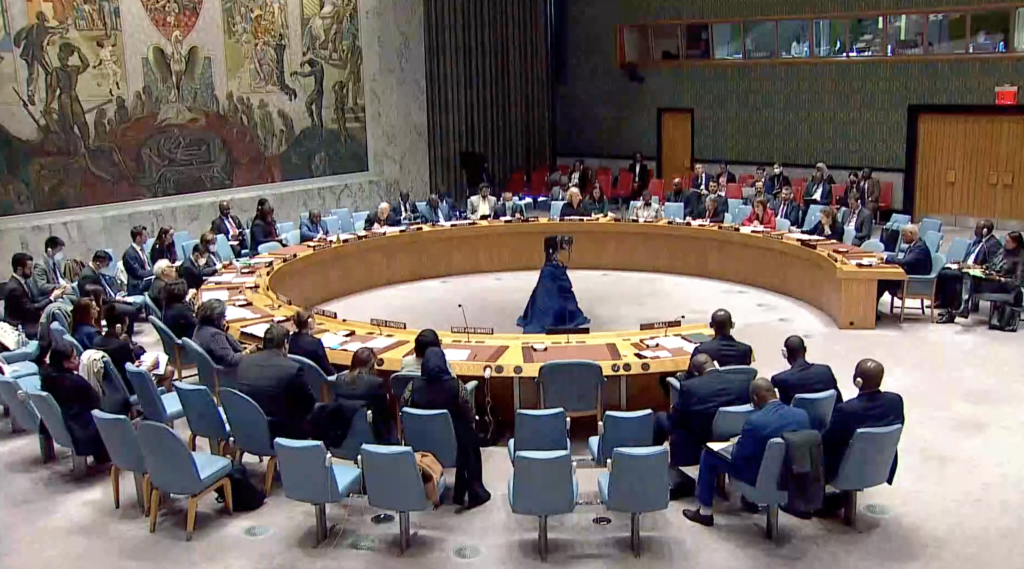Statement by Deputy Permanent Representative Anna Evstigneeva at UNSC briefing on the situation in Mali
Mr.President,
We thank Special Representative of the Secretary-General El Ghassim Wane for the briefing on the work of MINUSMA and the situation in Mali. We welcome Minister of Foreign Affairs of Mali A.Diop to this meeting. We extend our condolences to the troop-contributing states whose peacekeepers continue to sustain losses in line of duty. Our condolences also go to the government of Mali regarding a huge toll among civilians and personnel of Malian armed forces who keep fighting against the terrorist threats.
We agree with the assessments of the recent SG’s report that the situation in Mali is getting more stable. Transitional authorities and “signatory groups” take active part in the socio-political dialogue, which has boosted state reform process and given an impetus to the implementation of the provisions of the Algiers Peace Agreement.
Parameters of the disarmament, demobilization, and reintegration program for 2023-2024 have been endorsed. In the recent months, some important documents regarding recovery of state institutions have been adopted, and consultative platforms for preparation for the elections, political and institutional reforms have resumed their work. In September and October, the Agreement Monitoring Committee reconvened after a 12-month break. A specialized commission was created, which submitted to the Head of State a new draft constitution on 11 October.
Mali sets forth its persistent and challenging fight against terrorism. Due to the security vacuum that resulted from the unprovoked withdrawal of French and EU contingents from the Malian territory, terrorist groups “Islamic State in the Greater Sahara” and “Support Group for Islam and Muslims” galvanized their activities. Despite some objective difficulties, in the recent months Malian armed forces have proven able to achieve considerable progress in their fight against terrorists and militants. Russia provides comprehensive assistance to the Malian military, i.a. in terms of enhancing its capacity and training of personnel. We appreciate the efforts of MINUSMA that helps the Malian forces with such issues as evacuation of the injured and recovery of critical infrastructure. We are convinced that maintaining a proper level of security is a prerequisite for convening trustworthy democratic elections in the country.
We welcome the progress of MINUSMA’s dialogue with the transitional government regarding the rotation of the Mission’s contingents. By all means, the host authorities need to be aware of such movement of the contingents. We regret that some states either put on hold their participation in MINUSMA or withdrew from the Mission completely. We need to analyze carefully all reasons for that, as well as other challenges that Blue Helmets are faced with during MINUSMA’s strategic review, the results of which are to be published by January 2023.
Russia welcomes the agreements made by Mali and ECOWAS in July this year, thanks to which the major part of regional sanctions against Mali were lifted. Nevertheless, we are deeply concerned over the attempts to turn the Sahel into an arena for geopolitical opposition, which is something completely alien to the region and contrary to the national interests of its peoples and states. In particular, internal contradictions in the G5 Sahel, which were largely provoked by external influence, forced Mali to exit this association and thus called into questions the very prospects of G5 Sahel’s further operation. Artificial crises in relations of Western African states that are incited by outside actors confirm that Western neo-colonialism seeks to retain its influence in the continent and poses quite a real threat to it.
Strongly negative reaction of Western states to the strengthening of Russian-Malian cooperation is yet another manifestation of the patronizing approach and double standards on the part of former colonial powers. The lies about alleged Russian mercenaries are spread by those who spent not just years, but entire decades sending “soldiers of fortune” to Africa in order to overthrow the unwanted regimes, kill political activists and establish control over the continent’s natural resources. To say nothing of the fact that those countries are responsible for destabilization in the Sahel, which occurred after the Libyan intervention in 2011.
We have heard and apparently will hear more attempts to besmirch our assistance to Mali that cite corrupt insinuations regarding alleged violations of human rights. In this context, we reiterate our support for Bamako in conducting all the necessary investigations in this area. I stress that unlike some our Western colleagues, Russia is not trying to interfere with Malian policies, and does not put forward any pre-conditions for rendering assistance that could affect Mali’s national sovereignty. Our relations are based on years-long equal bilateral cooperation and shared understanding of our common goal, namely fighting against the global evil of terrorism. Therefore, it should not come as a surprise that we have received no complaints from our African partners regarding the parameters of our interaction. We call on Western states to stop abusing the Security Council platform, respect Malians, their choice, and their efforts to settle the situation in the country.
In conclusion, in today’s complicated situation we believe it necessary to provide effective assistance to the Malian authorities, while at the same time encouraging them to carry out a well-balanced and thoughtful settlement policy. We call all our colleagues to do so, and stand ready to cooperate with them in order to ensure soonest normalization in Mali, as well as bring peace and stability to the entire Sahara-Sahel region.
Thank you.
